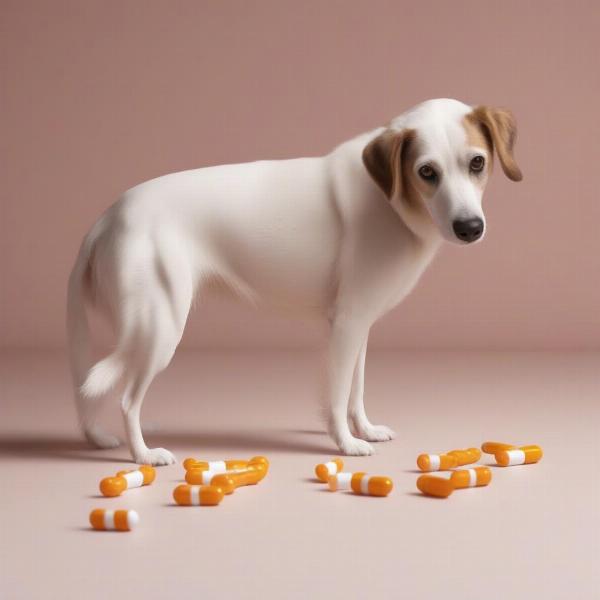Giving your dog medication can sometimes feel like a wrestling match. Whether it’s a short course of antibiotics or a long-term treatment, reconciling dog medication with your furry friend’s preferences can be tricky. This guide provides practical tips and strategies to make medication administration easier for both you and your dog.
Understanding Your Dog’s Resistance
Why do some dogs resist medication? Often, it’s the unfamiliar smell, taste, or texture. Imagine being forced to swallow something you find unpleasant! Some dogs may also have had negative experiences with medication in the past, leading to anxiety and avoidance.  Dog resisting taking medication
Dog resisting taking medication
Making Medication Palatable
One of the simplest solutions is to disguise the medication. Try hiding pills in tasty treats like pill pockets, cheese, or peanut butter. Be sure to check with your veterinarian about which foods are safe to mix with your dog’s specific medication. For liquid medications, you can try mixing them with a small amount of low-sodium broth or their favorite wet food.
The Direct Approach
If disguising the medication doesn’t work, you may need to administer it directly. For pills, gently open your dog’s mouth, place the pill at the back of their tongue, and close their mouth, stroking their throat to encourage swallowing. For liquid medications, use a syringe or dropper to administer the correct dose along the side of your dog’s cheek.
Positive Reinforcement
Positive reinforcement is key. Reward your dog with praise, petting, or a small treat after they take their medication. This helps create a positive association with medication time and reduces anxiety.
When to Seek Professional Help
If your dog continues to resist medication, consult your veterinarian or a certified dog trainer. They can provide personalized guidance and suggest alternative administration techniques.
Can I crush my dog’s pills?
Crushing pills can alter their effectiveness. Always check with your vet before crushing or splitting any medication.
What if my dog vomits after taking medication?
If your dog vomits shortly after taking medication, contact your vet immediately for advice.
How to store dog medication safely?
Store medications in a cool, dry place, away from direct sunlight and out of reach of children and pets.
Can I give my dog human medication?
Never give your dog human medication without consulting your veterinarian. Many human medications are toxic to dogs.
What are the signs of an allergic reaction to medication in dogs?
Signs of an allergic reaction can include vomiting, diarrhea, facial swelling, hives, and difficulty breathing. Seek immediate veterinary attention if you notice any of these symptoms.
How can I make medication time less stressful for my dog?
Creating a calm and positive environment, using positive reinforcement, and seeking professional help if needed can make medication time less stressful.
ILM Dog, your trusted partner in canine care, offers expert advice and resources on dog breeds, health, training, nutrition, grooming, and much more. We are committed to providing practical and reliable information to help you navigate every aspect of dog ownership. For further assistance, please contact us via email at [email protected] or phone at +44 20-3965-8624. Visit ILM Dog for more information.